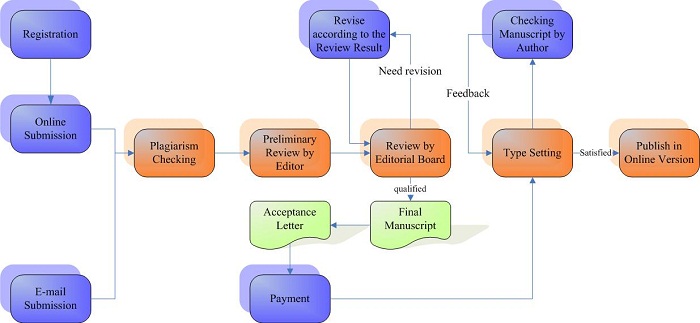Education, Language and Sociology Research (ELSR) is an international open-access journal published by Scholink. The journal aims to provide a high-level platform for scholars and researchers all over the world to share latest findings and views in the field of Education, Language and Sociology Research. We would welcome scholars and researchers engaging in the related field to submit your manuscripts which are complete unpublished and original works and not under review in any other journals to Education, Language and Sociology Research. Both of online submissions and E-mail submission (elsr@scholink.org) are acceptable. ------------------------------------------------ The journal includes, but is not limited to the following fields:
| The journal will feature: Descriptive Articles, Research Reports, Relevant Reviews, Short Communications, Viewpoint Commentaries, and Case Studies. All submitted articles will be peer reviewed.
|
Journal Publishing Flowchart

Announcements
Author Publication Fees |
|
Article Publication: 400.00 (USD) Book Review, Study Protocol, Case Study, Short Communication, Short Research Report (Within 2000 Words): 300 (USD)
|
|
| Posted: 2024-04-12 | |
Recruit Reviewers |
|
We are recruiting reviewers for the journal. If you are interested in this position of reviewing submissions, we welcome you to join us. Please download and finish the application form at http://www.scholink.org/doc/Application%20Form%20for%20Editorial%20Board%20Members.doc Please send the completed application form to the editor: elsr@scholink.org |
|
| Posted: 2020-01-16 | |
Education, Language and Sociology Research has been included in CrossRef |
|
| We have the great pleasure of announcing that Education, Language and Sociology Research has been included in CrossRef. Interested authors are strongly encouraged to submit their quality articles for review and publication. | |
| Posted: 2020-01-16 | |
| More Announcements... |
Vol 7, No 1 (2026)
Table of Contents
Articles
|
Adeoye Adeyinka Olusola
|
p1
|
|
Farhiba Ferdous, Assistant Professor
|
p13
|


